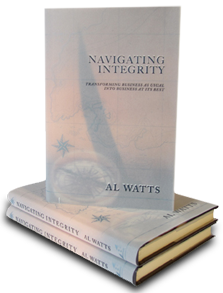Once again this season, our sloop LOON is serving up life and leadership lessons, and in unexpected ways. The first this year began when a charterer reported a small fresh water leak at the base of LOON’s toilet – by itself not serious as long as the head’s seacocks were closed, one of which draws in Lake Superior water for flushing. The charterer assured me that he had closed the seacocks, so I put the small leak on a list of items to attend to the next weekend. After asking a friend at LOON’s dock to check on her, he called to inform me that she was taking on water – at that point several inches over the cabin floor. As it turns out the head seacocks were open, which had allowed lake water to seep in over several days. Compounding the problem, LOON’s electric bilge pump never kicked in; the float switch for triggering it had apparently been disconnected for years.
Any one of those factors alone would not have caused a serious problem; all at once they could have swamped LOON. I thought of other well-known compounded error tragedies, including the Titanic. In that case, too much speed and inattention were compounded by an insufficient number of lifeboats, poorly handled lifeboat deployment, the ship designer’s and captain’s hubris, and assumptions that the Titanic was actually “unsinkable.” Compounded errors also caused the second worst U.S. air disaster in history in 2001. The NTSB concluded that pilot error, compounded by poor design and inadequate training, caused the jumbo jet’s tail section of American Airlines flight 587 to break off, killing all 260 passengers on board and five on the ground.
Compounded errors also contribute to leadership and organizational failures. It was bad enough that a Penn State University football coach sexually assaulted underage boys in its own athletic facilities; troubles mushroomed when the behavior was concealed from authorities for fear of tarnishing its football reputation and jeopardizing funding. In the case of our great recession and 2008’s economic meltdown; speculative investments by banks, compounded by a significant decline in home values, highly leveraged homeowners, credit restrictions and yes, hubris, contributed to the worst economic collapse since the Great Depression. Missed market signals, flawed design, service outages and missed deadlines were among the multiple failures contributing to RIM’s demise. A combination of equipment failure, rushing and not following safety protocols led to BP’s Gulf oil spill, the largest in history.
Here are some ways that we can limit compounded errors and their damage:
- Clarify priorities and expectations. Whether around core values, safety protocols on an oil rig or explicit instructions for closing seacocks, make sure that everyone understands what to do and how to do it.
- Trust, but verify. Especially when stakes are high, verify proper execution. A mountain rescuer once shared how if he hadn’t checked a safety line that a crew member said was secure, he would have fallen to his death.
- Challenge assumptions – your and others’. Is this ship really unsinkable? Are we really too big to fail? What if our assumptions about market and technology direction or consumer preferences are wrong?
- Pay attention. In the Coast Guard Auxiliary we called it “situational awareness;” what is happening around me, and how might that affect our mission? Have conditions changed, and do I need to make any adjustments?
- Check your work and thinking – or better yet ask someone else. I’ve learned that it’s good practice to have another double check my lat and long calculations before entering them into GPS; ‘better to swallow a little pride than end up on the rocks!
- As Will Rogers said, “When you find yourself in a hole, stop digging!” Whether investing good money after bad, doubling down to recoup losses, staying in a bad relationship or telling another lie to cover prior mistakes, we need to know when to cut our losses. It’s easier said than done, but look at the better outcomes for those who “come clean” early vs. late (David Letterman vs. John Edwards, for example.)
- Know yourself and your limitations. I use a survey in my work (Hogan Development Survey) that reflects potential career derailers, one of which is “boldness ‘ – a propensity for over-confidence and excessive risk-taking. Knowing that in advance will likely help us at least question whether excessive boldness may contribute to failure.
LOON is ship-shape again, and as usual I am wiser for the experience. I’ve had a chance to think about how compounded errors contribute to leadership and organizational failures, how to recognize them earlier and ways to limit them.
What has your experience with compounded errors been? What can you add to the list of ways to avoid them or limit their damage?
Might you or your organization be in any danger of succumbing to compounded errors now? How can you reverse direction or limit the damage?
“No matter how far you’ve gone down the wrong road, turn back.”
(Turkish Proverb)
For want of a nail the shoe was lost.
For want of a shoe the horse was lost.
For want of a horse the rider was lost.
For want of a rider the message was lost.
For want of a message the battle was lost.
For want of a battle the kingdom was lost.
And all for the want of a horseshoe nail.







Hi Al, another great article discussing a relevant topic for organizations and families alike. It connects with accountability, with the courage to acknowledge and own your mistakes, and it connects with the too often missing skill of confronting each other respectfully and clearly. Not so done in this “Minnesota Nice” state, but needed here as much as anywhere else.
Thanks for another interesting read Al!
‘Good point about the need for respectful confrontation, Carolien. Too often (yes, perhaps more in Minnesota!) we overlook or lack the courage to flag actions or developments that will exacerbate problems. “Truth-telling,” the capacity to deal with reality, is essential to authentic leadership. Thanks again for your as-usual insightful comments!